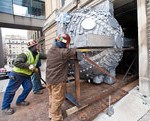Category Science & Technology
Researchers outline food security, climate change road map
While last month's meeting of the United Nations Framework Convention on Climate Change (UNFCCC) in Durban, South Africa, made incremental progress toward helping farmers adapt to climate change and reduce agriculture's climate footprint, a group of international agriculture experts urges scientists to lay the groundwork for more decisive action on global food security in environmental negotiations in 2012.
New approach to combat intractable bacterial infections
Bacteriologist Marcin Filutowicz specializes in developing antimicrobial technologies that one day may help replace antibiotics—and save lives—as the power of our antibiotics arsenal wanes.
UW-Madison biochemist to serve on president’s National Medal of Science committee
University of Wisconsin–Madison biochemist Judith Kimble has been selected to serve on President Obama's Committee on the National Medal of Science.
Online engineering grad programs ranked No. 1
U.S. News and World Report has ranked UW–Madison No. 1 for its online graduate engineering programs in the categories of teaching practices and student engagement, and student services and technology.
Award supports study of internal-combustion diagnostic tool
For the past several decades, engineers have been investigating low-temperature combustion as a means of creating engines with diesel-like efficiency and no pollutant emissions. A UW–Madison mechanical engineering assistant professor has received a grant to study the process.
UW geneticist James Crow passes away
The UW–Madison community is mourning the loss of a legend: James F. Crow, professor emeritus of genetics, who passed away peacefully at his home on Jan. 4, two weeks shy of his 96th birthday.
Study pinpoints Ritalin’s influence
Millions of individuals diagnosed with attention deficit hyperactivity disorder (ADHD) are helped by methylphenidate, the stimulant better known as Ritalin. Now researchers at the University of Wisconsin–Madison have pinpointed the area of the brain in which Ritalin does its work.
Recent sightings: Cosmic dynamo installation
With the exterior doors temporarily removed from Sterling Hall, workers move a three-meter diameter, hollow aluminum sphere, an essential component of the Madison Plasma…
Big Ten Network series to air
The Big Ten Network will debut "Impact the World," a powerful new original series that shifts the focus from the playing fields to the world stage, beginning Tuesday, Jan. 10, at 8:30 p.m. (CST).
Four receive honors from American Physical Society
Four University of Wisconsin–Madison researchers are among 240 newly named fellows of the American Physical Society, an honor bestowed upon no more than half of one percent of the professional society’s membership.
UW-Madison engineer receives Grand Challenges Point-of-Care Diagnostics Grant
A biomedical engineer at the University of Wisconsin–Madison will receive a $2.5 million Point-of-Care Diagnostics Grant through Grand Challenges in Global Health.
Three UW–Madison faculty members honored as AAAS fellows
Three University of Wisconsin–Madison researchers have been named fellows of the American Association for the Advancement of Science (AAAS).
For Midwesterners, more boxcars mean cleaner air
Shifting a fraction of truck-borne freight onto trains would have an outsized impact on air quality in the Midwest, according to researchers at the University of Wisconsin–Madison.
100 years of discovery: Celebrating South Pole research
To mark the centennial of Roald Amundsen’s expedition to the South Pole, the IceCube Research Center invites you to join them for an evening of exploration and learning on Tuesday, December 13 from 6:30–8:30 at the Wisconsin Institutes for Discovery.
Annual Christmas lab show canceled
The 2011 “Once Upon a Christmas Cheery, In the Lab of Shakhashiri” shows, scheduled for Saturday and Sunday, Dec. 10 and 11, have been canceled.
Snow in the Rockies, dry summers in the Southwest?
New simulations of summer rains in the arid American Southwest show that they are influenced by the previous winter's snowpack in the Rocky Mountains.
Pioneering molecular biologist, formerly at UW–Madison, passes away
Masayasu Nomura, a molecular biologist who studied the structure that forms proteins inside cells at University of Wisconsin–Madison between 1963 and 1984, passed away on Nov. 19 at age 84 in California.
Global winds could explain record rains, tornadoes
Two talks at a scientific conference this week will propose a common root for an enormous deluge in western Tennessee in May 2010, and a historic outbreak of tornadoes centered on Alabama in April 2011.
David Krakauer nurtures scientific collaboration
Education and research are splintering into new specialties at an unsustainable rate, according to David Krakauer.


